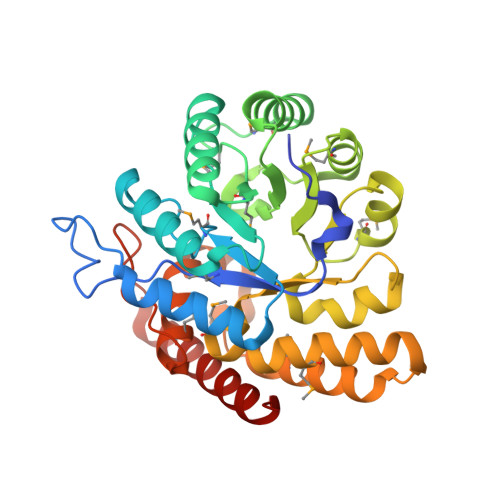Structural Characterization of the Hydratase-Aldolases, NahE and PhdJ: Implications for the Specificity, Catalysis, and N-Acetylneuraminate Lyase Subgroup of the Aldolase Superfamily.
LeVieux, J.A., Medellin, B., Johnson Jr., W.H., Erwin, K., Li, W., Johnson, I.A., Zhang, Y.J., Whitman, C.P.(2018) Biochemistry 57: 3524-3536
- PubMed: 29856600
- DOI: https://doi.org/10.1021/acs.biochem.8b00532
- Primary Citation of Related Structures:
6DAN, 6DAO, 6DAQ - PubMed Abstract:
NahE and PhdJ are bifunctional hydratase-aldolases in bacterial catabolic pathways for naphthalene and phenanthrene, respectively. Bacterial species with these pathways can use polycyclic aromatic hydrocarbons (PAHs) as sole sources of carbon and energy. Because of the harmful properties of PAHs and their widespread distribution and persistence in the environment, there is great interest in understanding these degradative pathways, including the mechanisms and specificities of the enzymes found in the pathways. This knowledge can be used to develop and optimize bioremediation techniques. Although hydratase-aldolases catalyze a major step in the PAH degradative pathways, their mechanisms are poorly understood. Sequence analysis identified NahE and PhdJ as members of the N-acetylneuraminate lyase (NAL) subgroup in the aldolase superfamily. Both have a conserved lysine and tyrosine (for Schiff base formation) as well as a GXXGE motif (to bind the pyruvoyl carboxylate group). Herein, we report the structures of NahE, PhdJ, and PhdJ covalently bound to substrate via a Schiff base. Structural analysis and dynamic light scattering experiments show that both enzymes are tetramers. A hydrophobic helix insert, present in the active sites of NahE and PhdJ, might differentiate them from other NAL subgroup members. The individual specificities of NahE and PhdJ are governed by Asn-281/Glu-285 and Ser-278/Asp-282, respectively. Finally, the PhdJ complex structure suggests a potential mechanism for hydration of substrate and subsequent retro-aldol fission. The combined findings fill a gap in our mechanistic understanding of these enzymes and their place in the NAL subgroup.















